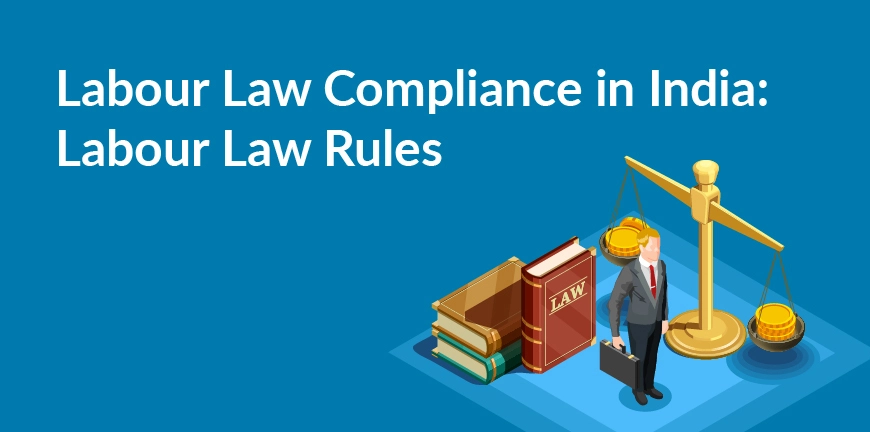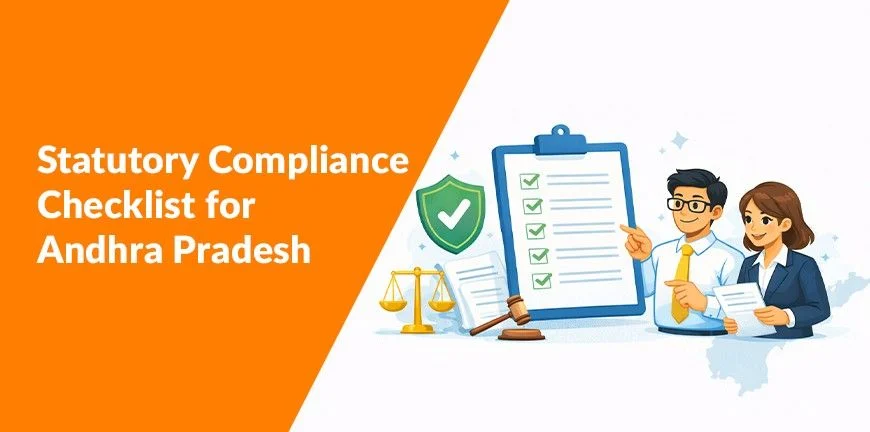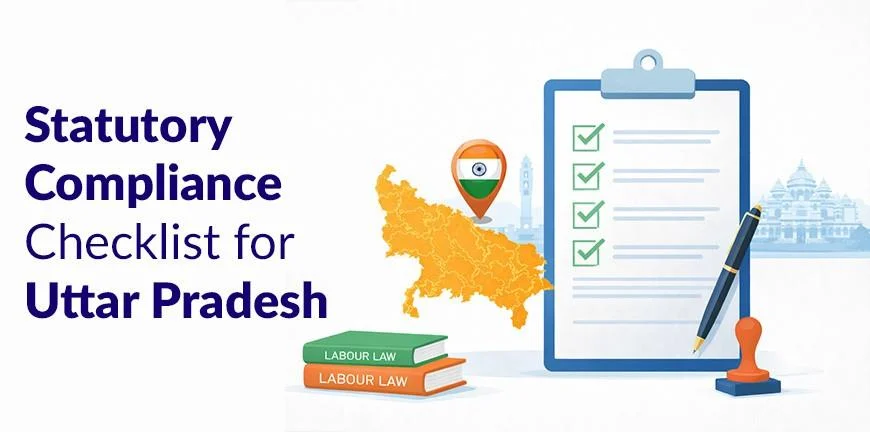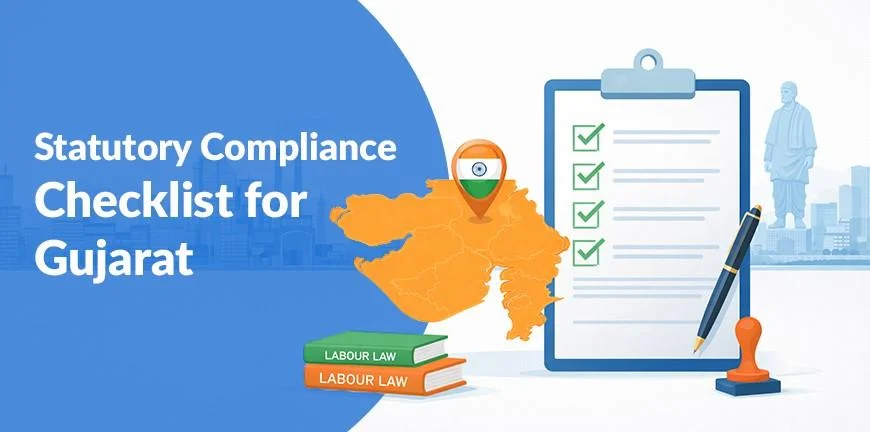
The Evolution of NAPS to Something Bigger: Will it Succeed?
26/02/2024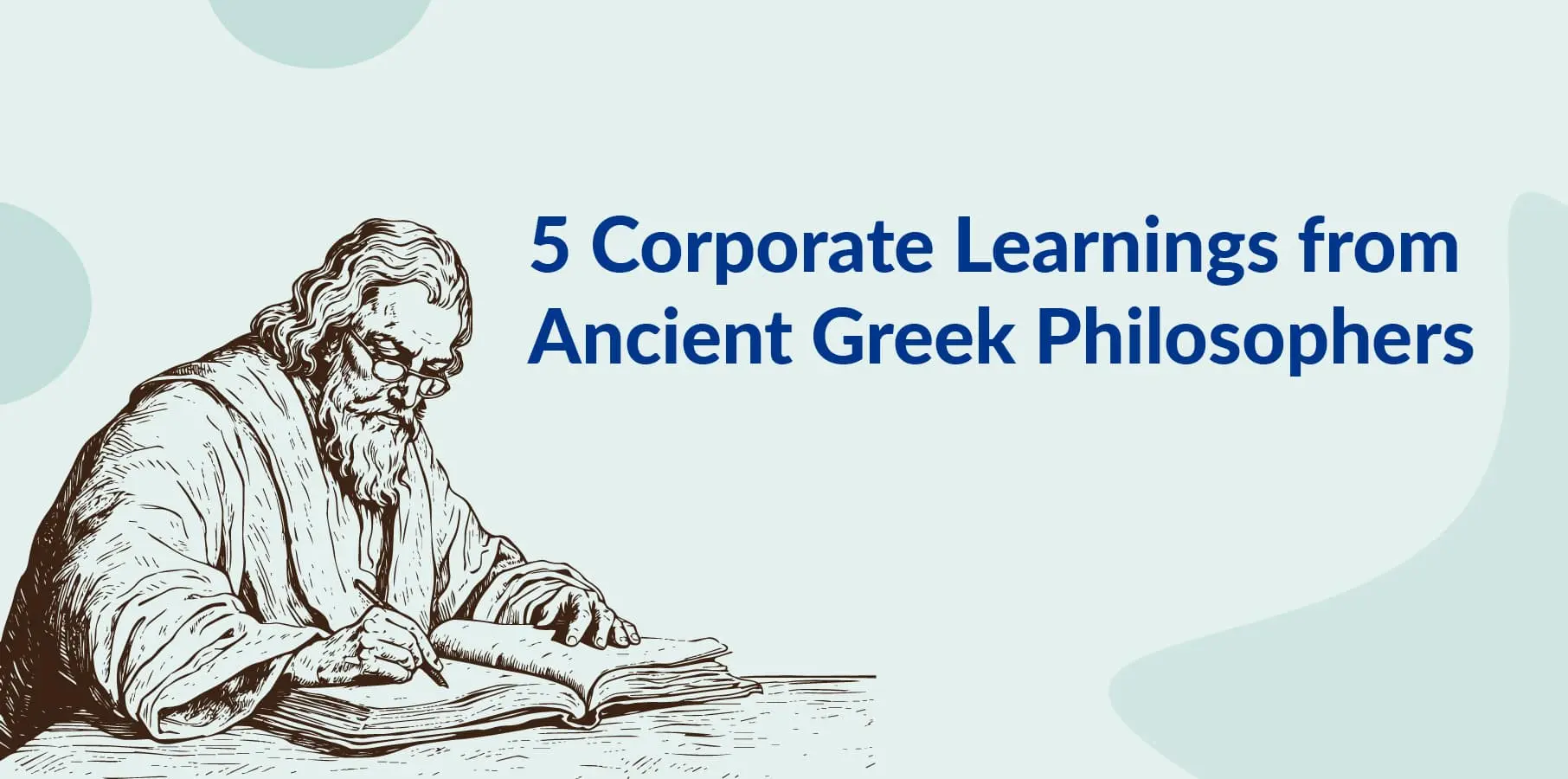
5 Corporate Learnings from Ancient Greek Philosophers
11/03/2024- What Is Labour Law Compliance?
- What are the Key Concepts under Labour Law Compliance?
- What Are the Major Labour Laws and Acts in India?
- What Is a Labour Law Compliance Checklist?
- What Are the Penalties for Non-Compliance with Labour Laws in India?
- How Are Labour Laws Changing Under India’s New Labour Codes?
- How Can Businesses Ensure Compliance with Labour Laws?
- Are You Looking for a Labour Law Advisor?
- Key Takeaways
- Frequently Asked Questions
Labour law compliance forms the foundation of fair, ethical, and legally sound employment practices in India. With over 32,542 labour-related compliances & 17,819 carrying imprisonment penalties, the compliance landscape is complex. As labour laws evolve and enforcement becomes stricter, organizations must ensure full alignment with statutory and regulatory requirements to avoid penalties, disputes, and reputational damage.
This detailed discussion on labour law compliance will help businesses understand key labour laws, effective compliance checklists, recent reforms, & best-practice strategies, enabling employers to protect employees, reduce risk, & build a sustainable, legally secure workplace.
What Is Labour Law Compliance?
Labour law compliance meaning is pretty straightforward and states that “Labour Law Compliance refers to a state of a company’s adherence to the various employment-related rules, regulations, and statutes established by the central and state governments of India.
These laws cover areas such as wages, employee benefits, working hours, safety, social security, and industrial relations. Ensuring labour law compliance protects both employers and employees by promoting transparency, fairness, and ethical workplace practices.
Labour law compliance also helps organizations avoid penalties, legal disputes, and reputational risks while maintaining a positive and compliant business environment.
What are the Key Concepts under Labour Law Compliance?
Here are the key concepts covered under labour law compliance:
1. Salary
What is the remuneration you are offering an employee? What other benefits does it include? What are the total deductions from it? These questions will help you arrive at an ideal salary for the first important step in labour law compliance.
2. Work schedules
What is the shift timing in the company? Is it a night shift, and how convenient is it for an employee? You must also look at whether the working hours are considered favourable by the employee.
3. Occupational Safety
Occupational safety is also very important in labour law compliance. How safe is the work environment? Are there any hazards that the employees should know about? Also, look at how you can make the work environment safer for employees.
4. Due notice for resignation
What is the minimum duration an employee must serve as a notice period before leaving the company? Why was the employee terminated, if he/she was? You must also look at the policies governing the notice period and the exit interview process itself. All of this will ensure compliance with labour laws in India, even when the employee is leaving the company.
5. Unemployment compensation
Is there any compensation for unemployment in the country, and what are its requirements? If anyone has been unemployed for a while, what is the compensation due from the government to help keep the search active, and how long will the compensation be provided?
6. Harassment protection
Are there proper laws in place in the company to help protect against harassment? How do these laws fit in with the laws instituted by the centre and the state? What compensation is to be provided to the victims of such harassment?
7. Overtime compensation
Is suitable compensation provided to an employee, in line with their salary and stature, for any overtime work? How is the quantum of work calculated? Is it pro-rata as per the salary provided to the employee?
8. Maternity benefits
Expectant mothers must be provided with the benefits that are due to them. This is another crucial point for compliance with labour laws in India. Have you, as an employer, provided them with the leave and minimum salary that is due to them, and for the specified duration? What can you do to improve the paternity and maternity benefits that you offer?
What Are the Major Labour Laws and Acts in India?
Here is a list of key Labour Laws and Provisions applicable in India:
- The Employees Compensation Act – 1923 – To compensate employees who were injured or died at the workplace.
- The Trade Unions Act – 1926 – To define laws related to registered trade unions.
- The Payment of Wages Act – 1936 – Applies to industrial workers and the wages that must be due to them.
- The Industrial Employment (Standing Orders) Act – of 1946 – Relates to the classification of workmen, leave policies and authority etc.
- The Industrial Disputes Act – 1947 – For the investigation and settlement of industrial disputes.
- The Employees’ State Insurance Corporation Act (ESIC) – 1948 – Employment insurance against injury or sickness.
- The Minimum Wages Act – 1948 – To prevent employee exploitation and to maintain a minimum standard of living for each employee.
- The Factories ACT – 1948 – Sets safety standards for workers employed in factories.
- The Employees Provident Funds and Miscellaneous Provision Act (EPF) – 1952 – Special provisions for all employees.
- The Employment Exchange (Compulsory Notification of Vacancies) Act – 1959 – For the compulsory notification of vacancies to employment exchanges.
- Income Tax Act – 1961 – Specifies that tax deductions are to be applied for all individuals with an income.
- The Maternity Benefit Act – 1961 – To regulate the employment of women who are to conceive and to provide benefits.
- The Apprentices Act- 1961 – Regulates the employment of apprentices in certain industries or trades.
- The Industrial Establishment (N&FH) Act – 1963 – To grant national and festival holidays to employees in industrial establishments.
- The Payment of Bonus Act – 1965 – For the payment of bonus due to an employee as a percentage of the salary.
- The Labour Welfare Fund Act (LWF) was issued in different states or by different industries in different years to protect labour rights.
- The Contract Labour (Regulation & Abolition) Act (CLRA) – 1970 – To provide habitable housing and other facilities for labour and to prevent exploitation.
- The Payment of Gratuity Act – 1972 – Relates to the payment of gratuity after a period and the maximum amount fixed.
- The Equal Remuneration Act – 1976 – to provide for equal remuneration to men and women, and to prevent discrimination between them.
- The Interstate Migrant Workmen (Regulation of Employment and Conditions of Services) Act – 1979 – To protect the rights of inter-state migrant workmen and to provide suitable conditions for work.
- The Child Labour (Prohibition & Regulation) Act – 1986 – To prevent child labour in any industry.
- Sexual Harassment of Women at Workplace (Prevention, Prohibition & Redressal) Act – 2013 – To prevent sexual harassment at the workplace for women.
- Shops and Commercial Establishments Act – Issued separately by each state, governing the licensing and operations of shops and other establishments.
What Is a Labour Law Compliance Checklist?
A Labour Law Compliance Checklist ensures organizations adhere to all applicable employment regulations, reducing legal risks & ensuring fair treatment of employees. Here are 7 essential steps included in the labour law compliance audit checklist that companies should follow to achieve 100% labour law compliance:
1. Maintain Statutory Registers & Records
Keep accurate, up-to-date registers on employee attendance, salary, bonuses, overtime, & leave as per applicable laws to ensure transparency & regulatory adherence during inspections & labour law compliance audits.
2. Verify Minimum Wages and Payment Timelines
Ensure all employees receive minimum wages as per the state’s notification & that salaries are disbursed within the legally defined timeline every month without delays.
3. Ensure PF, ESI, and LWF Deductions Are Accurate
Deduct & deposit Provident Fund, Employee State Insurance, & Labour Welfare Fund contributions correctly and within prescribed deadlines to prevent penalties or interest.
4. Adhere to Working Hours and Leave Policies
Deploy policies on working hours, overtime, rest days, & leave entitlements in line with the Factories Act & Shops & Establishments Act.
5. Display Mandatory Compliance Notices
Display statutory abstracts & notices in visible areas of the workplace, including health, safety, and employee rights information mandated by state and central labour authorities.
6. Conduct Regular Internal Compliance Audits
Schedule periodic internal and external audits to assess compliance gaps, update documentation, & stay aligned with changing laws or notifications from government authorities.
7. Train HR and Management Teams on Compliance Updates
Regularly train HR, payroll, & management teams on the latest amendments and changes in labour laws to prevent accidental violations or misinterpretations.
What Are the Penalties for Non-Compliance with Labour Laws in India?
Here are the 5 types of penalties levied on companies for not adhering to labour laws and statutory compliance mandates:
1. Heavy Monetary Fines
Non-compliance with mandatory labour laws can result in fines ranging from Rs. 10,000 to lakhs &crores, depending on the severity & frequency of the violation.
2. Imprisonment of Responsible Personnel
In serious cases of non-compliance with labour laws, employers or directors can face imprisonment for up to 3 years for repeated or intentional non-compliance with statutory labour provisions.
3. Loss of Business Licenses or Contracts
Persistent non-compliances under labour law can lead to suspension or cancellation of licenses, government tenders, or industry accreditations, damaging business continuity and credibility.
4. Reputational and Employee Trust Damage
Legal actions, penalties, or media exposure can severely tarnish an organization’s reputation, leading to employee dissatisfaction & lower retention rates.
5. Legal Proceedings and Litigation Costs
Non-compliance may lead to prolonged legal battles, increased administrative workload, & costly litigation that drains company resources and productivity.
How Are Labour Laws Changing Under India’s New Labour Codes?
Here are 5 ways labour laws are changing through India’s New Labour Codes:
1. Simplification of 29 Labour Laws into 4 Codes
The GOI has consolidated multiple existing labour laws into four major codes for easier interpretation, compliance, & unified governance across India.
2. Focus on Ease of Doing Business
The new codes promote transparency & digitization, making compliance filing, inspections, & registrations easier via online platforms for employers.
3. Uniform Definition of ‘Wages’
All labour codes define “wages” uniformly, ensuring consistency in calculating PF, gratuity, & bonus across all employment sectors and organizations.
4. Enhanced Worker Rights and Benefits
The new labour codes strengthen social security coverage, ensure timely wage payments, & extend benefits to gig and platform economy workers.
5. Stricter Penalties and Digital Compliance Monitoring
Penalties for compliance violations are now more stringent, with provisions for digital tracking & real-time monitoring of labour law adherence.
How Can Businesses Ensure Compliance with Labour Laws?
Here are 5 ways companies can ensure labour law compliance in India:
1. Stay Updated with the Latest Labour Law Amendments
Regularly monitor government notifications, circulars, & labour law updates to ensure that all internal policies and HR systems reflect current legal requirements.
2. Implement Robust Compliance Management Systems
Adopt digital compliance tools and automated software to track statutory deadlines, maintain documentation, & generate compliance reports efficiently.
3. Conduct Regular Employee and HR Training
Organize awareness programs & training sessions to educate HR teams and employees on rights, responsibilities, and compliance obligations.
4. Perform Periodic Compliance Audits and Gap Analysis
Schedule quarterly or annual audits to identify compliance gaps, verify record accuracy, & ensure proactive correction of potential violations.
5. Partner with a Labour Law Compliance Management Agency
Collaborate with expert agencies like ALP Consulting for end-to-end compliance management, audit support, and professional guidance to ensure complete statutory adherence and peace of mind.
Are You Looking for a Labour Law Advisor?
If there is something a business can’t do without, then that’s its people. To ensure that the people are all happy and work goes on without any interruptions, the rights of individuals must be safeguarded at the workplace. This is governed by labour laws in the country of employment and how well they are implemented in your business. Labour law compliance needn’t be difficult to manage.
Are you looking for a labour law advisor? Connect with Alp Consulting, an HR partner with nearly 3 decades of experience in staffing and recruitment, payroll, and compliance, and bid your labour law compliance worries goodbye.
Key Takeaways
- Labour law compliance safeguards employee rights while ensuring business transparency, ethical operations, and sustainable growth.
- India has over 32,000 labour compliances, emphasizing the importance of continuous monitoring and expert management.
- New Labour Codes simplify compliance, digitalize processes, and strengthen worker protection and employer accountability.
- Regular audits, training, and digital compliance systems reduce risks and enhance long-term organizational credibility.
- Partnering with ALP Consulting ensures 100% compliance, operational efficiency, and peace of mind for employers.
Frequently Asked Questions
1. What is labour law compliance in India?
Labour law compliance India ensures businesses follow legal standards regarding wages, working hours, employee safety, & social security benefits.
2. Why is labour law compliance important in 2026?
In 2026, stricter labour codes demand compliance to avoid penalties, enhance workforce satisfaction, and maintain operational transparency.
3. What are the key labour laws every company must follow?
Companies must follow laws on wages, social security, industrial relations, occupational safety, maternity benefits, and equal remuneration.
4. What are the penalties for non-compliance with labour laws?
Non-compliance with labour laws and statutory compliance can lead to heavy fines, legal prosecution, license suspension, & reputational damage, impacting long-term business sustainability.
5. How can companies ensure labour law compliance?
Companies can conduct audits, use a labour law compliance checklist, deploy compliance software, train HR teams, and partner with top compliance experts like ALP Consulting for the best outcomes.
Contact Us For Business Enquiry

Hariharan Iyer
Hariharan Iyer is the Vice President – Operations at ALP Consulting, bringing over 40+ years of experience in HR outsourcing and labour law compliance. He leads end-to-end HRO operations, ensuring process efficiency, statutory compliance, and seamless service delivery for clients across industries. With a strong background in labour law governance and workforce management, Hariharan plays a key role in driving operational excellence and compliance-led HR solutions at ALP Consulting.

